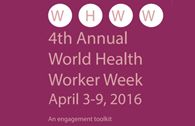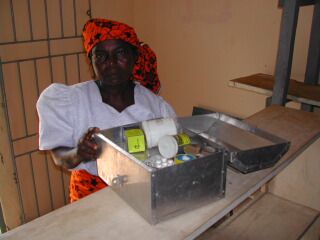Case Management &Health Workers &Training Bill Brieger | 08 Nov 2017
Health provider orientation to national malaria case management guidelines in regional hospitals in Burkina Faso
 Good clinical practice in managing malaria requires awareness and understanding of national case management guidelines. Moumouni Bonkoungou, Ousmane Badolo, and Thierry Ouedraogo of Jhpiego in Collaboration with the National Malaria Control Program and sponsorship from the “Improving Malaria Care” project of USAID/PMI explain how health workers in Burkina Faso were oriented to the national guidelines at the 66th Annual Meeting of the American Society of Tropical Medicine and Hygiene. They have found that short orientations are less expensive and reach more health workers that traditional training sessions.
Good clinical practice in managing malaria requires awareness and understanding of national case management guidelines. Moumouni Bonkoungou, Ousmane Badolo, and Thierry Ouedraogo of Jhpiego in Collaboration with the National Malaria Control Program and sponsorship from the “Improving Malaria Care” project of USAID/PMI explain how health workers in Burkina Faso were oriented to the national guidelines at the 66th Annual Meeting of the American Society of Tropical Medicine and Hygiene. They have found that short orientations are less expensive and reach more health workers that traditional training sessions.
Malaria remains the leading cause of consultations, hospitalization and death in health facilities in Burkina Faso. In 2015, 23,634 cases of severe malaria were recorded in hospitals with 1,634 deaths, a mortality rate of 7% at this level compared to 1% nationally. Since April 2014, 1,819 providers from 49 districts have been trained in malaria case management, specifically at the first level (health center – CSPS). Conversely, at referral centers – medical centers with surgical units (CMA), regional hospitals (CHR) and university hospitals (CHU) – providers are not well educated on the new WHO guidelines for malaria prevention and case management.
This situation led the United States Agency for International Development-supported Improving Malaria Care (IMC) project and the National Malaria Control Program (NMCP) to organize orientation sessions for providers in 8 CHR in September 2016. The sessions were conducted by trainers at the national level, supported by clinicians from hospitals including pediatricians and gynecologists.
A total of 298 health workers were oriented, including 24 physicians, 157 nurses, 56 midwives, as well as pharmacists and laboratory technicians. 39% of participants were female and 43% have less than 5 years of service in these hospitals. The sessions have provided participants with an opportunity to familiarize themselves with the new guidelines for malaria prevention and case management.
 The orientations have also made it possible to identify the difficulties encountered by referral structures in malaria case management, which include: insufficient staff, inadequate capacity building, no blood bank in some hospitals, reagent stock-outs, inadequacies in the referral system, and insufficient equipment.
The orientations have also made it possible to identify the difficulties encountered by referral structures in malaria case management, which include: insufficient staff, inadequate capacity building, no blood bank in some hospitals, reagent stock-outs, inadequacies in the referral system, and insufficient equipment.
To address these difficulties, staff redeployment, internal supervision, development of tools to monitor reagents stocks have been proposed. To move forward, response plans for the period of high malaria transmission is expected to be developed for these referral facilities.
Health Workers &Human Resources &IPTp &Training &Treatment Bill Brieger | 07 Nov 2017
Using rapid task analysis to strengthen Pre-Service Education (PSE) learning and performance of critical malaria interventions in Liberia
 Understanding the tasks that health workers perform in real life can improve their basic Training. Marion Subah of MCSP and Jhpiego shares experiences in using Task Analysis to improve pre-service training of midwives and lab technicians in Liberia. Her findings summarized below, are presented at the American Society of Tropical Medicine’s 66th Annual Meeting.
Understanding the tasks that health workers perform in real life can improve their basic Training. Marion Subah of MCSP and Jhpiego shares experiences in using Task Analysis to improve pre-service training of midwives and lab technicians in Liberia. Her findings summarized below, are presented at the American Society of Tropical Medicine’s 66th Annual Meeting.
Health worker task analysis helps human resource planners and managers update pre-service education (PSE) curricula and plan needed in- service training. In Liberia, a task analysis was conducted focusing on Liberia’s midwives’ and Medical Laboratory Technicians’ (MLT) work practices.
service training. In Liberia, a task analysis was conducted focusing on Liberia’s midwives’ and Medical Laboratory Technicians’ (MLT) work practices.
Task lists were developed using curricula, job descriptions and professional scope of practice, and validated by key stakeholders for each cadre. Responses from 25 MLTs and 26 midwives were examined that addressed the following questions:
- How often do you do the task (frequency)?
- Where did you learn to do the task (location)?
- How well do you think you are able to perform the task (performance)?
- How critical is the task in terms of patient and/or public health outcomes (criticality).
 Eligibility criteria included those currently practicing between 6 months and 5.5 years following graduation. Midwives were assessed for five tasks relating to malaria service provision, including provision of preventive treatment for malaria in pregnancy, management of vector borne diseases, diagnosis and management uncomplicated malaria in adults and children (respectively), and provision of malaria preventive services.
Eligibility criteria included those currently practicing between 6 months and 5.5 years following graduation. Midwives were assessed for five tasks relating to malaria service provision, including provision of preventive treatment for malaria in pregnancy, management of vector borne diseases, diagnosis and management uncomplicated malaria in adults and children (respectively), and provision of malaria preventive services.
 Lab technicians were assessed for one malaria task, performance of parasitological tests. On average 61% of midwives learned these malaria tasks in PSE, 74% said they performed these tasks daily, 80% felt proficient in performing the tasks, and 82% rated the tasks moderate to high in criticality. For MLTs, 88% learned malaria testing in pre-service education, 100 % performed this task daily, 77% felt they were proficient and 93% said the task was of moderate to high criticality.
Lab technicians were assessed for one malaria task, performance of parasitological tests. On average 61% of midwives learned these malaria tasks in PSE, 74% said they performed these tasks daily, 80% felt proficient in performing the tasks, and 82% rated the tasks moderate to high in criticality. For MLTs, 88% learned malaria testing in pre-service education, 100 % performed this task daily, 77% felt they were proficient and 93% said the task was of moderate to high criticality.
The results from this rapid task analysis are being applied to the current curricula review. Courses that could be updated or strengthened have been identified. Malaria Case Management Technical Update and Effective Teaching Skills Training are being organized for tutors at the training schools. Finally, integrated supportive supervision tools are being strengthened to improve performance of these malaria tasks by midwives and lab technicians.
CHW &Diagnosis &Health Workers &Performance &Training &Treatment Bill Brieger | 06 Apr 2017
World Health Workers Week, a Time to Recognize Health Worker Contributions to Malaria Care
 Since the beginning of the Roll Back malaria Partnership in 1998 there has been strong awareness that malaria control success is inextricably tied to the quality of health systems. Achieving coverage of malaria interventions involves all aspects of the health system but most particularly the human resources who plan, deliver and assess these services. World Health Worker Week is a good opportunity to recognize health worker contributions to ridding the world of malaria.
Since the beginning of the Roll Back malaria Partnership in 1998 there has been strong awareness that malaria control success is inextricably tied to the quality of health systems. Achieving coverage of malaria interventions involves all aspects of the health system but most particularly the human resources who plan, deliver and assess these services. World Health Worker Week is a good opportunity to recognize health worker contributions to ridding the world of malaria.
We can start with community health workers who may be informal but trained volunteers or front line formal health staff. According to the Frontline Health Workers Coalition, “Frontline health workers provide immunizations and treat common infections. They are on the frontlines of battling deadly diseases like Ebola and HIV/AIDS, and many families rely on them as trusted sources of information for preventing, treating and managing a variety of leading killers including diarrhea, pneumonia, malaria and tuberculosis.”
 The presence of CHWs exemplifies the ideal of a partnership between communities and the health system. With appropriate training and supervision CHWs ensure that malaria cases are diagnosed and treated promptly and appropriately, malaria prevention activities like long lasting insecticide-treated nets are implemented and pregnant women are protected from the dangers of the disease. CHWs save lives according to Nkonki and colleagues who “found evidence of cost-effectiveness of community health worker (CHW) interventions in reducing malaria and asthma, decreasing mortality of neonates and children, improving maternal health, increasing exclusive breastfeeding and improving malnutrition, and positively impacting physical health and psychomotor development amongst children.”
The presence of CHWs exemplifies the ideal of a partnership between communities and the health system. With appropriate training and supervision CHWs ensure that malaria cases are diagnosed and treated promptly and appropriately, malaria prevention activities like long lasting insecticide-treated nets are implemented and pregnant women are protected from the dangers of the disease. CHWs save lives according to Nkonki and colleagues who “found evidence of cost-effectiveness of community health worker (CHW) interventions in reducing malaria and asthma, decreasing mortality of neonates and children, improving maternal health, increasing exclusive breastfeeding and improving malnutrition, and positively impacting physical health and psychomotor development amongst children.”
 CHWs do not act in isolation but depend on health workers at the facility and district levels for training, supervision and maintenance of supplies and inventories. These health staff benefit from capacity building – when they are capable of performing malaria tasks, they can better help others learn and practice.
CHWs do not act in isolation but depend on health workers at the facility and district levels for training, supervision and maintenance of supplies and inventories. These health staff benefit from capacity building – when they are capable of performing malaria tasks, they can better help others learn and practice.
A good example of this capacity building is the Improving Malaria Care (IMC) project in Burkina Faso, implemented by Jhpiego and supported by USAID and the US President’s malaria Initiative. IMC builds capacity of health workers at facility and district level to improve malaria prevention service delivery and enhance accuracy in malaria diagnosis and treatment. Additionally capacity building is provided to health staff in the National Malaria Control Program to plan, design, manage and coordinate a comprehensive malaria control program. As a result of capacity building there has been a large increase in malaria cases diagnosed using parasitological techniques and in the number of women getting more doses of intermittent preventive treatment to prevent malaria during pregnancy.
Malaria care is much more than drugs, tests and nets. Health worker capacity is required to get the job done and move us forward on the pathway to eliminate malaria.
Human Resources &IPTp &Training Bill Brieger | 26 Oct 2015
Improving provision of malaria services through provider training in Burkina Faso
Colleagues[1] from Jhpiego’s Burkina Faso Improving Malaria Care USAID-supported project and the Johns Hopkins Bloomberg School of public Health are presenting a poster at the 64th ASTMH Annual Meeting in Philadelphia at noon on Tuesday 27th October 2015. Please stop by Poster 969 and discuss the results as presented in the Abstract below.
 In 2013, malaria was the main reason for consultation (53.90%), hospitalization (63.20%) and death (49.60%) in health facilities; children under 5 and pregnant women are most affected. Recent revisions to the World Health Organization’s (WHO) guidance to maintain effective approaches to defeating malaria, include monthly dosing of intermittent preventive treatment for pregnant women (IPTp), starting from the 13th week of gestation.
In 2013, malaria was the main reason for consultation (53.90%), hospitalization (63.20%) and death (49.60%) in health facilities; children under 5 and pregnant women are most affected. Recent revisions to the World Health Organization’s (WHO) guidance to maintain effective approaches to defeating malaria, include monthly dosing of intermittent preventive treatment for pregnant women (IPTp), starting from the 13th week of gestation.
To align with the latest WHO guidance, the Burkina Faso Ministry of Health, with support from the USAID-funded Improving Malaria Care (IMC) project, revised national malaria guidelines in March 2014. 68 trainers from 9 health regions were trained on the revised national malaria guidelines.
From June to September 2014, 744 providers from 524 health facilities in 21 districts (33%) were trained on the prevention and management of malaria cases. To ensure updated guidance reaches all health workers, the training included a module on how to update colleagues in their respective facilities.
 During supervision visits, most trained providers were using the new guidelines and pregnant women are increasingly receiving the third and higher doses of SP before delivery. In the first six months after the training sessions, pregnant women, who received the third dose of SP (IPTp3) increased from 0% to 12%. Three months later, that proportion rose to 30%. Comparatively, in the remaining 42 districts who received only the copies of the new guideline without training, IPTp3 was 5% nine months after receiving the guidelines.
During supervision visits, most trained providers were using the new guidelines and pregnant women are increasingly receiving the third and higher doses of SP before delivery. In the first six months after the training sessions, pregnant women, who received the third dose of SP (IPTp3) increased from 0% to 12%. Three months later, that proportion rose to 30%. Comparatively, in the remaining 42 districts who received only the copies of the new guideline without training, IPTp3 was 5% nine months after receiving the guidelines.
The training sessions contributed to improving the implementation of revised IPTp guidelines and uptake of IPTp 3 and higher better than distribution of the new guidelines alone. As a result the IMC project will scale-up the training in Year 2 to 600 more providers from 464 health facilities, and other partners have also agreed to support the National Malaria Control Program to reach remaining facilities. Challenges in increasing IPTp uptake include commodity distribution and inadequate engagement of private health facilities to update their practices and reporting of SP distribution.
[1] Ousman Badolo, Stanislas Nebie, Moumouni Bonkoungou, Mathurin Dodo, Thierry Ouedraogo, Rachel Waxman, William R. Brieger
Human Resources &Training &Treatment Bill Brieger | 03 Nov 2014
Inspiring Quality in Pre-Service Education on Malaria in Tanzania: Jhpiego at ASTMH
Monday at noon (3 October 2014) at the American Society for Tropical Medicine and Hygiene Annual Meeting in New Orleans, Jhpiego will be presenting two posters. Grace Qorro of Jhpiego’s Tanzania office has one entitled: #Quality Inspired Project – A Key to Achieving Results with Malaria Interventions.” Her abstract is shared below.
 With an aim to accelerate malaria case management, Tanzania Ministry of Health and Social Welfare (MoHSW) is strengthening its pre-service education program to ensure graduates have the right knowledge and skills to diagnose and treat malaria. Investment in pre-service education lessens the burden on in-service training since those entering the workforce will have the knowledge and skills they need to provide.
With an aim to accelerate malaria case management, Tanzania Ministry of Health and Social Welfare (MoHSW) is strengthening its pre-service education program to ensure graduates have the right knowledge and skills to diagnose and treat malaria. Investment in pre-service education lessens the burden on in-service training since those entering the workforce will have the knowledge and skills they need to provide.
 Jhpiego, through MAISHA (Mothers And Infants Safe, Healthy and Alive) program, provided technical assistance to the MoHSW to help develop a pre-service malaria case management-updates Learning Resource Package (LRP), which includes: Facilitator’s Manual, Participant’s Manual, Activity Worksheets and Training Modules addenda.
Jhpiego, through MAISHA (Mothers And Infants Safe, Healthy and Alive) program, provided technical assistance to the MoHSW to help develop a pre-service malaria case management-updates Learning Resource Package (LRP), which includes: Facilitator’s Manual, Participant’s Manual, Activity Worksheets and Training Modules addenda.
 The LRP was developed based on national malaria policy, guidelines and in-service training materials; it is taught using job aids, power point presentations, video demonstration and numerous case scenarios which reflect what actually happens in real life situations at service delivery points. The LRP aims at reinforcing appropriate practices for care of malaria patients and management of commodities with emphasis on parasite-based diagnosis and compliance to results, proper recording and reporting; and management of malaria in special situations and groups.
The LRP was developed based on national malaria policy, guidelines and in-service training materials; it is taught using job aids, power point presentations, video demonstration and numerous case scenarios which reflect what actually happens in real life situations at service delivery points. The LRP aims at reinforcing appropriate practices for care of malaria patients and management of commodities with emphasis on parasite-based diagnosis and compliance to results, proper recording and reporting; and management of malaria in special situations and groups.
 The training package is well organized with laboratory and medical supplies which gives each participant an opportunity for hands-on activity to acquire and strengthen their skills. Checklists to guide Quality Assurance/Quality Improvement (QA/QI) processes have been included in these training materials.
The training package is well organized with laboratory and medical supplies which gives each participant an opportunity for hands-on activity to acquire and strengthen their skills. Checklists to guide Quality Assurance/Quality Improvement (QA/QI) processes have been included in these training materials.
The project successfully provided competence-based orientation on malaria case management updates to 210 medical instructors. Annually, it reaches more than 4,000 students from eight Zonal Health Resource Centers and 480 students from Medical Universities.
There is a need to incorporate the addenda developed into these training modules for easy use. In the near future, clinical skills-mentorship will be conducted in selected schools using the nationally approved QA/QI checklists.

